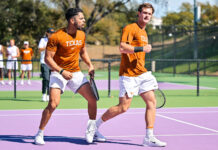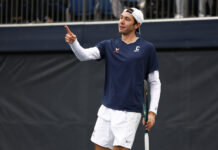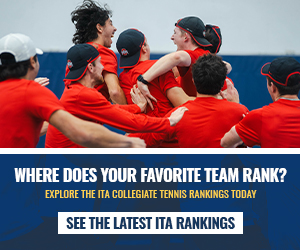Stanford Men’s Tennis’s Christian Kontaxis has been putting the extra time he has due to his season being cancelled to good use. In fact, the redshirt sophomore has devoted much of his time to the virus that suddenly stopped sports, and much of the world, in its tracks. The Rancho Mirage, Calif. native has been assisting an epidemiologist to predict the spread of COVID-19 in his own backyard, the Coachella Valley.
ITA | Please briefly explain the predictive modeling that you have been doing on the spread of COVID-19.
Kontaxis | Essentially, we wanted to predict how the spread of SARS-CoV-2 would impact the Coachella Valley, which hosts one of the larger elderly populations in the United States. Using what was present in the literature, and adjusting for our valley’s demographic, we estimated hospitalization rates, reproduction number (R0), incubation times, among other statistics – in order to predict the impact this virus will have on our community, and the measures we could take to minimize the impact. In addition to these statistics, the model took into account quarantine fraction, which, in essence, is a percentage that could show the impact isolation measures would have on our community, in preventing the overstress of our healthcare system and in saving lives.
ITA | How did you become involved with Dr. Patricia Cummings and her work?
Kontaxis | I had previously worked on a project with Dr. Eric Leroux, who received his MD from Stanford, and he introduced me to Dr. Cummings.
ITA | What are some key takeaways from your research that can help flatten the curve?
Kontaxis | I would say the main takeaway is that everyone has an important role to play. Even though it may feel that social distancing and better yet, self-isolation, is redundant in terms of global impact, it really minimizes the reproduction rate of this virus when we stay at home as much as possible. In addition, if you must go out for essential duties, it is important to practice good handwashing and sanitation, to avoid touching your face, and if possible, to wear a mask.
ITA | How has your research affected the COVID-19 response by your local government?
Kontaxis | We have presented the research to hospitals, public health, county officials, local news media, and congressional representatives, in order to modify local behavior with regard to social distancing. Also, the model helped local hospitals plan with city officials and the community to predict emergency readiness and to prepare sufficient testing measures.
ITA | This research must be an invaluable experience for you as a molecular biology major, what interested you in the field in the first place?
Kontaxis | I find interesting how the composition of all living things could be broken down to molecules that each carry out specific duties. I wanted to understand how these molecules work, how we can better understand their mechanisms, and how we can manipulate the mechanisms of these molecules for the good of society.
ITA | What do you plan to do with your degree after graduation?
Kontaxis | I hope to pursue a masters degree in bioengineering or molecular biology, and then hopefully go to medical school.
ITA | How has the transition from in-person classes to online classes been?
Kontaxis | We start with online classes April 6th, so I will have to get back to you on that one. In the meantime, I need to find some funny backgrounds that I can use on my Zoom screen.

ITA | What inspired you to pursue playing tennis in college?
Kontaxis | I love playing the game, and I knew that to play the game I have always loved surrounded by teammates and fans would be an experience like no other.
ITA | Athletes across the country are learning to deal with their seasons being cut short – are there any lessons that you have learned from tennis that have helped you cope with this disappointment?
Kontaxis | I believe half of tennis is dealing with disappointment after a loss or a setback, and even during a match, dealing with losing points, games, and sets, so although it is disappointing to have our season cut short, especially after we were gaining momentum in practice and in matchplay, I know our team and all college athletes across the country will come back next year hungry to play. This pandemic has taught me that the simple things I take for granted in life are never guaranteed.
ITA | How has your team stayed connected during this time of social distancing?
Kontaxis | We have taken to group facetimes and Zoom to keep up. The second we all are set up, the good banter continues as though we had never left. Coach Goldstein has also challenged me to beat his personal record on the Peleton, which I sadly have not beaten yet.
ITA | What are you looking forward to when tennis is able to resume?
Kontaxis | I first look forward to seeing my teammates and coaches. But after that, I look forward to the competition and the routine I always have with tennis.
ITA | Outside of your research, what is one thing that you have been doing to stay busy?
Kontaxis | I have been cooking a lot for my family. We are a Greek family, and my yiayia who is 86, lives with us. She has been teaching me all of her best recipes, so this is definitely a silver lining.












